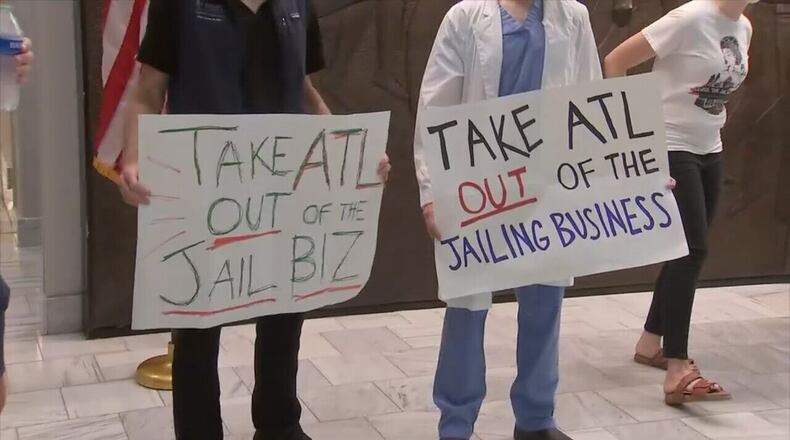The Atlanta City Council — after much debate, concern, amending and kvetching — voted this week to rent out Atlanta’s largely empty jail to help with overcrowding at Fulton County’s.
The 10-4 vote occurred after almost four hours of public haranguing that cutting such a deal was indecent and counterproductive. Fulton’s jail has been overcrowded for decades, they argued, and giving Sheriff Patrick Labat 700 more beds to play with was simply enabling a dysfunctional system.
Mind you, it is one that Labat, elected in 2020, has inherited but it is now his baby.
Those criticizing the four-year lease said locking up more people doesn’t reduce crime, which sounds like the argument that widening highways doesn’t relieve traffic, it just brings more.
One talking point often made during the afternoon of objection was that Mayor Andre Dickens was the same councilman who in 2019 introduced legislation that set up a task force to “reimagine” the city jail as a “center for equity.” (”Reimagine” is one of those insipid Atlanta-ese words that continues getting trotted out.)
The protestors hinted (loudly) that Dickens, who was pushing the rental deal, had become Flip Flopper in Chief.
This was the same Councilman Dickens who during the tumultuous summer of 2020 was on the losing side of an 8-7 vote to withhold a third of the police department’s budget until policing was “reimagined.” Two other councilmen on the losing side of that vote were in support of the jail deal this week — Matt Westmoreland and Amir Farokhi.
So what has happened since then? Well, two things. First, the social justice landscape of public opinion has changed drastically since George Floyd was murdered by a cop. And second, it’s much easier being an idealistic councilman — a 1 of 15 — than it is being the city’s one mayor, a job where practicality and realism smother you like a cold, wet comforter.
Credit: Miguel Martinez
Credit: Miguel Martinez
Mayoral spokesman Bryan Thomas said his boss “is still committed to ending the use of the (city) jail for incarceration purposes.” He said the county’s jail is in a “real and immediate crisis” with prisoners, who are largely Atlanta residents, now sleeping on floors.
The rent-a-jail is kind of a “relief valve,” Thomas told me. It will provide time for Fulton to get its act together.
“It ain’t our fault but it’s our problem,” the mayor told council members last week in a long, rambling speech to sell his jail plan.
A little history lesson on how we got here:
In 2019, when Dickens was introducing his close-the-jail bill, crime in Atlanta had been continually dropping for decades, as it had in the rest of the country. The reasons were many, varied and intensely debated: Increased incarceration had taken criminals off the street. Social programs sent people on the right path. The removal of lead from gasoline lessened the poisoning in developing minds. And even legal abortion prevented the birth of those who might later commit crimes.
Largely, we had no idea why crime was dropping.
Former Mayor Keisha Lance Bottoms packed the jail Reimaging task force with people who bought into her vision. Only seven of the 50 on that panel were from law enforcement.
Credit: City of Atlanta
Credit: City of Atlanta
By 2020, COVID hit and crime rates dropped even further. But In late May, George Floyd was killed in Minneapolis and tens of thousands of outraged Americans took to the streets. Protests were peaceful, until some were not.
At 3 p.m. on Friday, June 12, Bottoms released the results of the jail task force. Eight hours later, a man named Rayshard Brooks was shot to death by an Atlanta cop after fighting with two officers trying to arrest him.
The next night, the Wendy’s where he was killed got burned down. At first, the site became a rallying point for protestors. Later, it became “Mad Max in The ATL, a bizarre scene with a post-apocalyptic feel,” as I wrote at the time, with armed young men stopping motorists on the street. Ultimately, 8-year-old Secoriea Turner, a passenger in such a car, was killed.
Violence erupted across Atlanta. The number of shootings that June doubled from the previous year. The killing continued with 2020 and 2021 topping homicidal tolls not seen since the 1990s. And continued, and very noticeable, lawlessness like street racing was an exclamation point for the public.
In 2021, Bottoms had enough and pulled the plug on her reelection effort, allowing an opportunity for Dickens’ career advancement. By then, voters who worried about catching a stray bullet had gotten much more law-and-order than they were a year earlier.
Mayor Dickens the Pragmatist realizes he has to put a dent in crime — or at least show he’s doing something. Otherwise, people in the neighborhoods and the business community will be troubled.
Also, the Buckhead secession will get more oxygen again. And if that ever gains traction — and many state Republicans are hoping it will — then Atlanta would lose a huge chunk of its revenue, causing efforts to police or help the needy or provide social justice or even fill potholes to diminish rapidly.
It’s the kind of thing that keeps mayors up at night.
About the Author
Keep Reading
The Latest
Featured




